INDIANA ELKS and IU SCHOOL OF MEDICINE
Indiana: Home to Innovative Cancer Research and Care
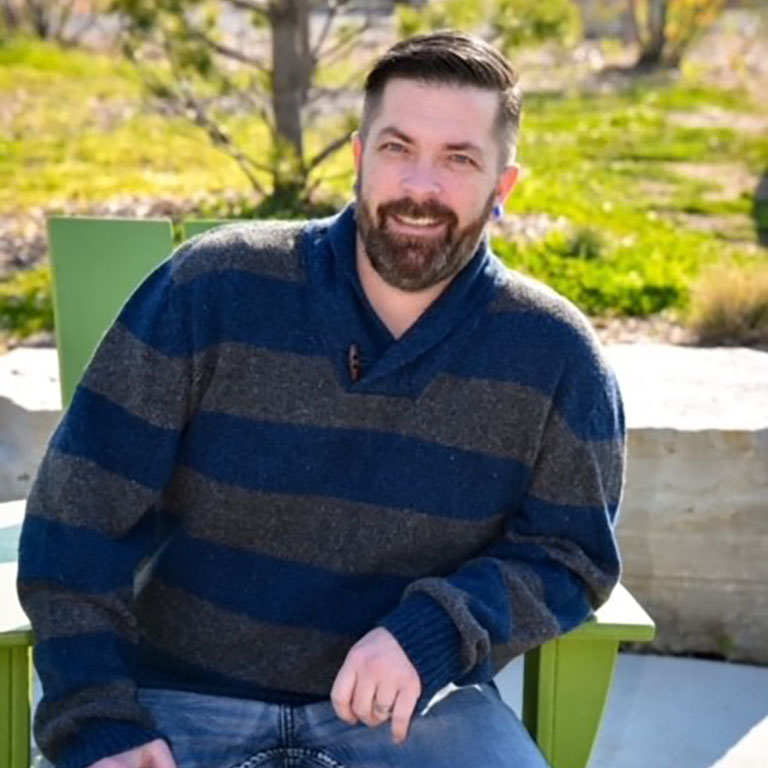
Research funded by the Indiana Elks benefits patients in Indiana and beyond
REPORT TO THE INDIANA ELKS 2021
IU Simon Comprehensive Cancer Center delivers treatment close to home
Though he is a native of South Bend, Indiana, Brian Stokes lived in several states over the years. In 2015, he and his husband, Lance Gustin, moved back to South Bend from Chicago and began to settle in.
“I’ve always been drawn back to Indiana,” Brian said. “My family is here, and it’s just home.”
Lance and Brian soon found themselves members of the Indiana Elks: Lance became an Elk in 2015 and Brian in 2019. Over the years, they have learned about the incredible impact the Elks make on cancer research at both Indiana University and Purdue University. They have witnessed firsthand the hard work Elks do to raise funds to help eradicate cancer in Indiana and beyond. And, they have felt fortunate to be a part of something so special in their home state. They never imagined how critically important these efforts would become to them personally.
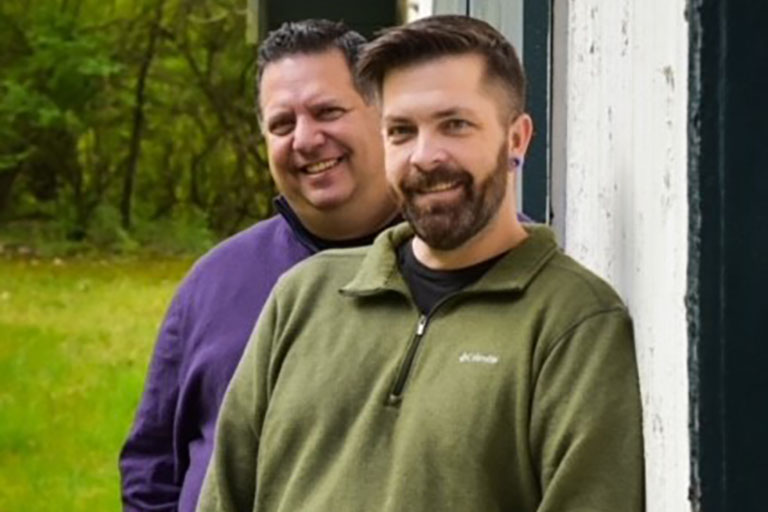
In September 2020, Brian saw a doctor, hoping to get some answers about the fatigue and stomach issues he had been experiencing for a while. He had been attributing his ailments to stress related to work and the COVID-19 pandemic. His doctor ordered bloodwork just to make sure Brian had not developed irritable bowel syndrome.
The following morning, Brian’s doctor called and advised him to go directly to the emergency room. His hemoglobin was dangerously low, and he needed a blood transfusion. The hospital care team determined that Brian was bleeding internally, but they weren’t sure of the source. A CT scan and a colonoscopy revealed terrible news: Brian had Stage III colon cancer.
“The next thing we knew, there was a flurry of doctors coming in and out of the room, talking about surgeries, life-changing alterations for Brian, treatments, outcomes... the list goes on,” Lance said.
After hearing all the overwhelming information from the physicians at their local hospital, Lance and Brian said they wanted a second opinion from someone at the Indiana University Melvin and Bren Simon Comprehensive Cancer Center.
“We explained that it wasn’t because we didn’t trust them, but that we are Elks and have a strong affiliation with IU though our philanthropic work,” Lance said.
Within hours of reaching out to IU, Lance got a call from former director of the IU Simon Comprehensive Cancer Center, Patrick Loehrer, MD. Loehrer asked for permission to access Brian’s medical information and present it the next day to the cancer center’s “Tumor Board,” where various medical experts comprehensively review the patient’s situation, including X-rays and scans, pathology report and other medical records. The group—which typically includes surgeons, medical oncologists, radiation oncologists, pathologists and other specialists—makes a recommendation for the patient’s treatment plan.
Loehrer arranged for Brian to see cancer center surgeon Bryan Holcomb, MD, just one week after the initial diagnosis. Holcomb assured Brian that the IU team agreed with the treatment plan his local hospital had suggested and recommended Brian undergo chemotherapy and radiation back in South Bend, lifting the burden of travel. He assured Brian that the IU team would monitor his progress, and he would have periodic follow-up appointments in Indianapolis. Holcomb also said he would like Brian to consider participating in an IU clinical trial once his cancer was under control.
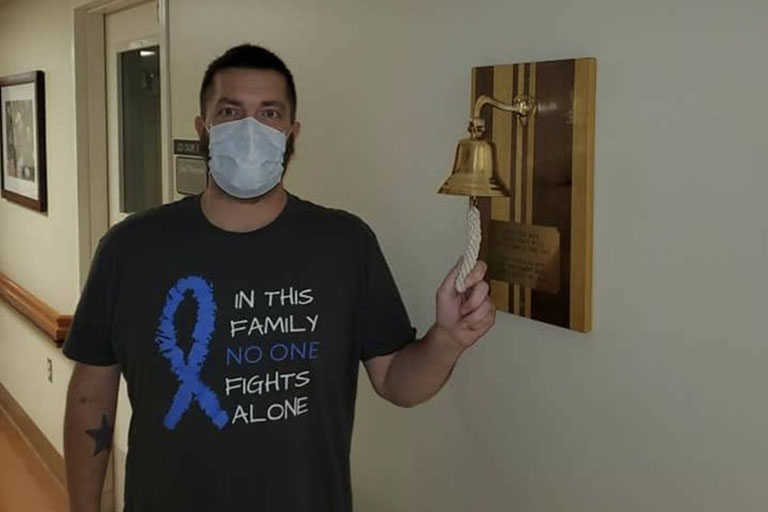
On November 25, 2020, after five weeks of chemotherapy and 36 rounds of radiation, Brian received great news: his tumor was no longer detectable.
“Brian got to ring that bell,” Lance said, referring to the tradition of ringing a bell to signify the conclusion of cancer treatment. “And we got to have a great Thanksgiving.”
After spending the holidays celebrating, Brian enrolled in an IU clinical trial to study the effects of a potential immune-boosting drug that may help prevent his cancer from recurring.
Brian and Lance are relieved to have access to top-notch care, informed by research, right in their own backyard. They are grateful to their fellow Indiana Elks for the time and effort they put toward advancing cancer research, right here at home.
A new leader on the home front
When Kelvin Lee, MD, stepped into his role as director of the Indiana University Melvin and Bren Simon Comprehensive Cancer Center in February 2021, he knew he was joining a top-notch team of cancer physicians and researchers. The surprising thing was that his new colleagues didn’t seem to realize it. Lee has been struck by how modest Hoosiers are as they go about their work.
“Humble as we might be, there is no doubt we have the talent, tools and commitment to cure cancers here at IU,” he shared. “It is clear why IU recently earned the National Cancer Institute’s highest designation and was named a comprehensive cancer center.”
That designation wasn’t achieved alone.
Generous philanthropy—including more than $4.5 million from the Indiana Elks—has helped build the cancer center over the years. Such generous support will continue to be critical as Lee leads the cancer center to improve the way cancer is prevented, detected and treated. His vision for the IU Simon Comprehensive Cancer Center is simple: 10 and 10 in 10.
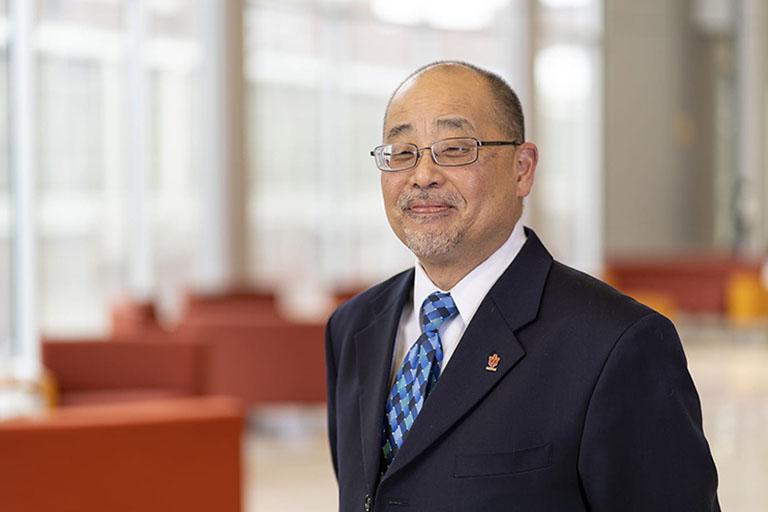
The first 10 refers to the cancer center’s score on its periodic reviews with the National Cancer Institute. A score of 10 means IU has earned the highest rating—exceptional.
The second 10 reflects IU’s goal to be ranked by U.S. News and World Report as one of the top 10 hospitals for cancer in the nation.
And the last 10? That sets the time frame. Lee wants to meet these benchmarks within 10 years.
“Ambitious? Absolutely. But I’m learning quickly that while Hoosiers are humble, we are also bold,” he said.
In fact, IU’s “Grand Challenges” goal to seek to cure three forms of cancer is what drew Lee here. It is in his DNA to build things, and the IU Simon Comprehensive Cancer Center is a place where he feels he can be part of a team stridently seeking to lift the burden of cancer.
Since science counts for little if it doesn’t help patients, the cancer center will utilize IU Health’s statewide network to expand access to clinical trials and new therapies.
No matter where someone lives in Indiana, Lee wants them to have access to exceptional cancer care, close to home.
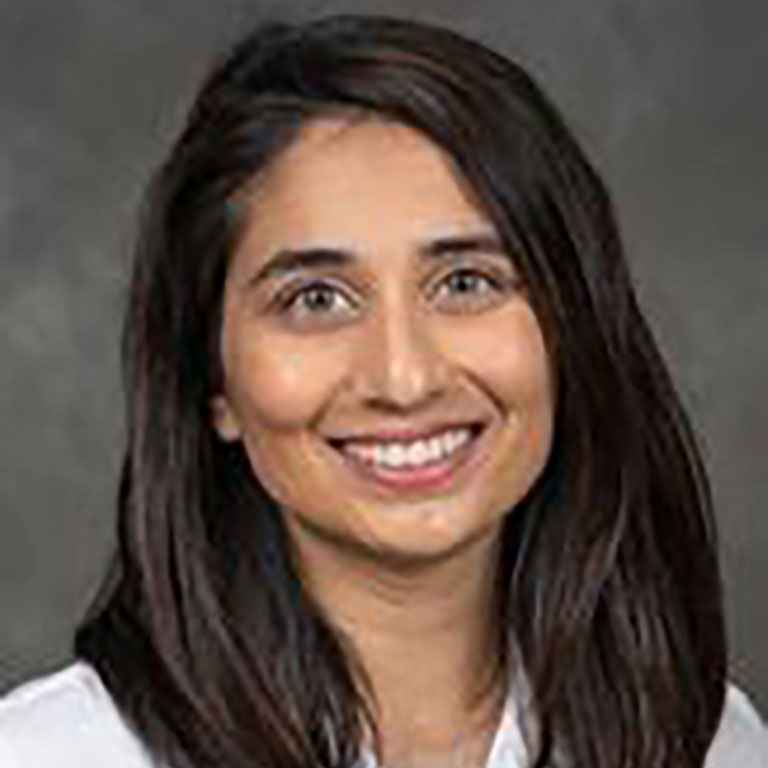
Anita Turk, MD
Clinical trials allow doctors to test new drugs and drug combinations to improve the standard of care. The IU clinical trial in which Brian is participating is directed by Anita Turk, MD, an assistant professor of clinical medicine at IU School of Medicine and associate member of the Experimental and Developmental Therapeutics research program at the IU Simon Comprehensive Cancer Center.
The trial seeks to determine if giving immunotherapy drugs after cancer patients complete chemotherapy and radiation decreases the risk of recurrence by triggering the immune system to fight any residual cancer. Brian requires six cycles of treatment, once every four weeks. After this is complete, Brian will have long-term follow-up with Turk and the clinical trial team for up to five years.
“People who participate in clinical trials are unsung heroes,” Turk said. “They are a critical component of helping us improve the care we deliver moving forward. If patients stop enrolling in clinical trials, progress stops.”
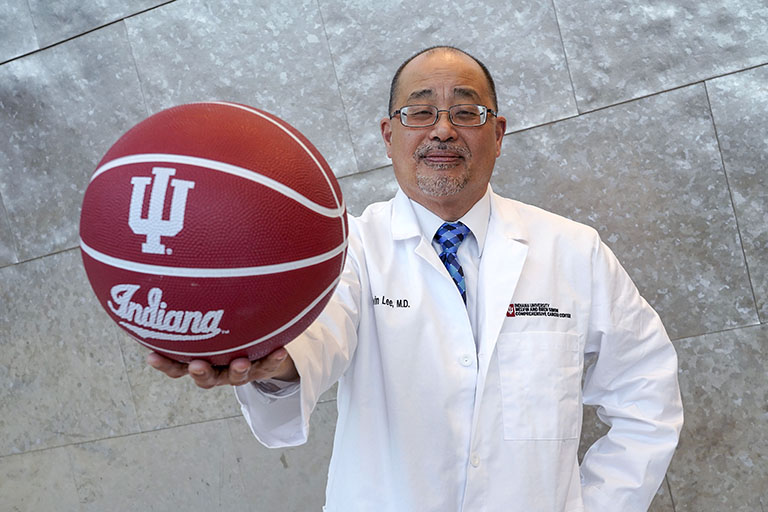
Dr. Lee is proud to be an Indiana Hoosier
In addition to being the director of the Indiana University Melvin and Bren Simon Comprehensive Cancer Center, Kelvin Lee is an expert in immunology and multiple myeloma. Before coming to IU, he served on the faculty of Roswell Park Cancer Institute in Buffalo, New York. While there, he led America’s groundbreaking collaboration with cancer researchers in Cuba who have developed a lung cancer vaccine Roswell is testing in clinical trials.
Lee currently holds $1.5 million in research grants. He has frequently been a principal investigator on multiple myeloma clinical trials. He holds two patents and has authored more than 100 papers in peer-reviewed journals.
Lee earned a bachelor’s degree in biomedical sciences and his medical degree with honors from the University of Michigan in Ann Arbor. He completed his medicine residency at the University of Colorado Medical Center in Denver and his oncology fellowship at the University of Michigan. He also completed a research fellowship at the University of Michigan’s Howard Hughes Medical Institute.




